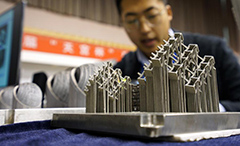Key AI guidelines unveiled
2017-12-15
China Daily
China unveiled a three-year plan on Dec 14 to boost the application of artificial intelligence in automobile, robots, healthcare and other sectors, in its latest push to upgrade the country’s real economy.
The plan, published on the official website of the Ministry of Industry and Information Technology, said China aims to build a globally competitive smart internet-connected car industry by 2020, with breakthroughs in self-driving platforms.
AI-enabled services robots will also be widely used in China within three years, with focus on robots that can help senior citizens and children. Also, the country aims to accelerate the use of AI-enabled systems to assist doctors in medical cases, the plan said.
The new policy details on how to better integrate AI into other industries and how to efficiently leverage the cutting-edge technology to push forward the Made in China 2025 strategy, said Lu Chuncong, director of the Policy and Economic Research Institute at the China Academy of Information and Communications Technology, a government think tank affiliated with the ministry.
According to him, with more emphasis on the industrial layout of AI, the new guideline distinguishes itself from the national AI development plan China unveiled in July, which focuses more on achieving technological breakthroughs in AI.
China said earlier this year it aims to build a 1 trillion yuan ($147.9 billion) AI core industry by 2030, which is supposed to stimulate as much as 10 trillion yuan in related business.
The country is aiming to lead the world in the research and development of AI, as well as its application in the healthcare, manufacturing and finance sectors. In November, the central government said it would build four national AI open innovation platforms by relying on Alibaba Group Holding Ltd in smart city technologies, Baidu Inc in self-driving technologies, Tencent Holdings Ltd in AI-enabled medical treatments, and iFlytek Co Ltd in voice-recognition technologies.
Zhou Ji, president of the Chinese Academy of Engineering, said that AI technology now plays a key role in the new technological revolution and the transformation of industry.
Supported by AI technologies, smart manufacturing is set to become the core technology for the next round of industrial upgrading, Zhou said.
Local governments are also rushing to roll out their own versions of policies to pounce at the strategic opportunities offered by AI. Zhongguancun, a technology hub in Beijing, for instance, said it aims to host 500 AI companies by 2020, with five of them being globally competitive. It expects such a dynamic ecosystem will help cultivate a 50 billion yuan core AI industry by that time.

